Abstract
The article aims to identify the desire of medium health professionals to practice in the country or abroad. The article analyzes the motivational process in Romanian hospitals. This initiative was made possible by using investigative questionnaire applied both individually and online on certain social groups with nurses as members. The instrumental research (questionnaire) had the following objectives: identifying the reasons why they chose the profession of nurse, investigating opinion on colleague’s exodus of Romanian health system and identify the degree of satisfaction on the Romanian health system; The research was conducted nationwide so they could highlight with greater certainty the elements that influence health professionals to conduct business environments in both health systems in the country and abroad. It should be noted that there are certain imbalances between those who want to practice in their home country and those who want to work abroad, both sides being conditioned by certain circumstances minor or major. Analysis carried me to rise to the solutions towards improving Romanian health system by fulfilling some pillars in order to increase the granting of medical care.
Keywords: Motivational processnursemedical staffsanitation
Introduction
Motivational process is a sensitive issue both for proper healthcare, and other industries. Motivation is a component of interest for all sectors, thus registering "a variety of approaches, not rarely contradictory" (Nicolescu & Verboncu, 2008).
Taking into account the most important approaches, the focus is both on the economic sense in which "motivation represents all factors that determine the behavior of an individual", and on the psychological, in this motivation being the "forces of conscious or unconscious that determines the behavior of the person " (Lefter et al., 2008).
Also, the term motivation refers to "all the dynamic factors that determine an individual's conduct" (Sillamy, 1996), embracing "all those impulses and incentives - biological, social and psychological - to overcome our laziness and push us willingly or not towards action" (Butler & McManus, 2002).
It has to be noticed that the health system should pay special attention to motivation, thus stimulating health professionals to offer medical attention in their home country. It is noteworthy that health professionals that are leaving the country "have a positive impact for the economy (increasing foreign source income), but negative for the Romanian health system (decreased number of medical staff)" (Iorga, 2016).
Problem Statement
Despite having more and more students for the healthcare domain, inside the institutions and hospitals we have less and less professionals to attend and to provide a high end service. The study proposes to remark and to point out some of the reasons why in the current healthcare system, we have a low rate of good professionals and where are the good professionals going and why.
Research Questions
This study is focused on the following questions: What are the reasons for becoming a nurse? and How satisfied are you with the benefits the nurse job offers? Also this paper points out: Why and in which conditions nurses are leaving to other countries to work.
Purpose of the Study
The research was conducted on the basis of previous analysis conducted in the purview of post-secondary school facilities, where the results lead to the increasing desire of young graduates to practice abroad. These data formed the basis of this approach in order to identify investigative desire of mid-level medical employees to practice in the country or abroad.
Questionnaires were applied to the nurses in public and private institutions, both individually and in the online environment. They provided data on the motivation they have to stay in the country, or to go abroad.
Research Methods
The group of nurses who participated in the study, was composed of:
Women and men having different medical specialties;
Aged 20 years and over 45 years;
For this descriptive study it was used a questionnaire, this research instrument being composed from 16 items with multiple responses.
The questionnaire was anonymous and was administered to the health care staff both directly (individual) and indirectly (on-line). Medium duration of response was 7-10 minutes.
The objectives of the questionnaire were:
documenting why they chose the profession of nurse;
investigating the opinion on colleague’s exodus from Romanian healthcare system;
Identify their satisfaction within Romanian healthcare system;
Findings
The research was conducted nationwide by individual questionnaires, emphasizing on information obtained from online questionnaires administered on different social on-line groups.
Characteristics of the nurses
The characteristics from the lot of nurses are represented in the table below, and follow:
age;
gender;
studies;
work experience;
In Table
All of the above table shows that the nursing profession is represented by females, percentage being 76%. Most of the respondents have post-highschool education (63%), others have undergraduate or graduate (masters) studies - percentage of approximately 37%.
The last feature of the lot identified in table
Work motivation and institution dependencies
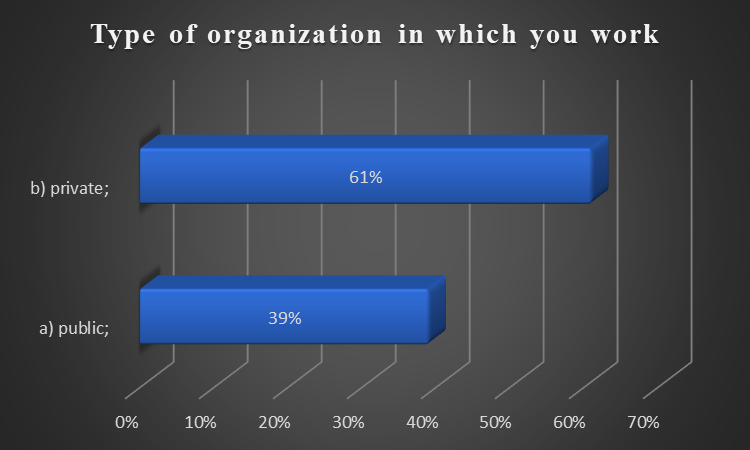
The chart above shows that over 60% of people surveyed operates in the private sector and the remaining 39% give medical care within a government unit.
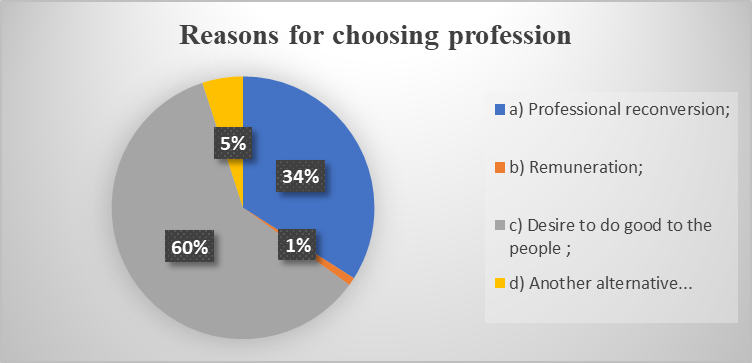
Figure
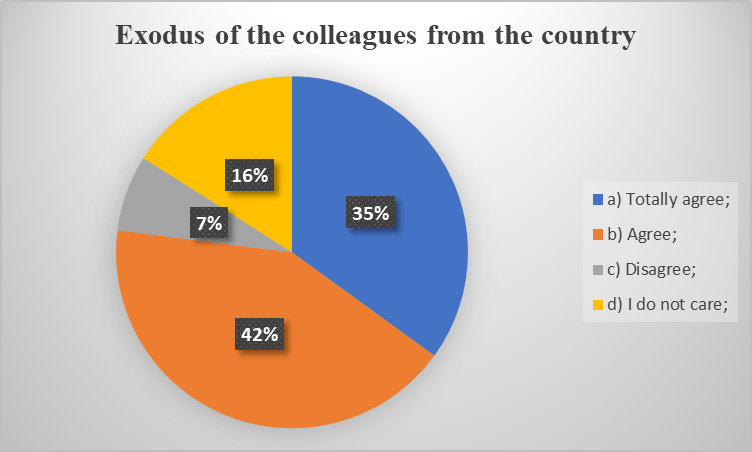
From figure
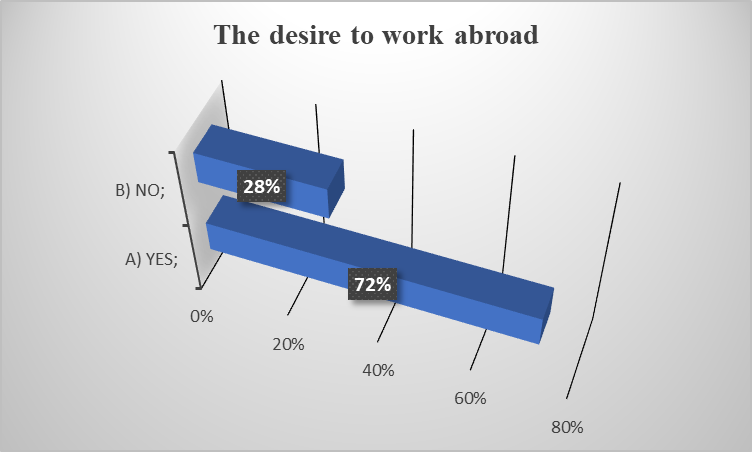
The graphical representation above highlights the willingness of health professionals to practice abroad with a significant percentage of 72%. The other participants in the study want to practice in the country, because they want to remain close to family.
Of those who wish to leave their homeland most prefer England (60%), followed by Germany (10%). Also other targeted viable options for leaving the country in smaller percentages are: France, Italy, Belgium.
Among other reasons for the activity abroad it is mentioned: remuneration, cutting-edge medical devices, good communication, respect from colleagues / patients and not least good working conditions.
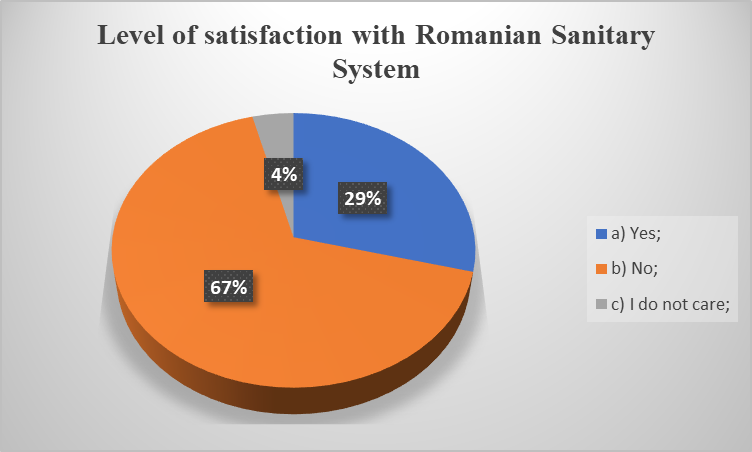
Taking into account the above chart, the level of satisfaction of health professionals is only 29%. Unfortunately a large percentage (67%) are dissatisfied or manifest disregard for the Romanian health system.
Conclusion
In the respondents' opinion, the nurse is the person providing health care and contributing to saving patients in various stages of disability representing for them "a guardian angel."
After the conducted analysis, first findings are that people who are determined to work abroad, are motivated mainly by getting enough money to fit their needs. There are other reasons, such as respect towards the profession, adequate working conditions, etc.
Secondly, we noticed that the main reason for not leaving the country is that health professionals are able to stay close with their families.
As a solution to improve the Romanian healthcare system we propose, after the analysis, the following pillars: improve our wages and working conditions (by changing the materials, tools and obsolete equipment) for the medical staff and not least raising the level of nurse profession by granting the deserved degree of appreciation.
The general conclusion is that there should be a balance between the conditions offered by the Romanian and Western healthcare system in order to keep healthcare professionals competent in their home country.
References
- Butler, G. & McManus, F. (2002). Psichology. A Very short introduction. Bucharest: Allfa.
- Iorga, C. (2016, April 8). Exportul de asistenți medicali [Nurse’s export]. Viata medicala [Medical Life Magazine], 15. Retrieved from http://www.viata-medicala.ro/*articleID_11659-dArt.html
- Lefter, V., Deaconu, A., Marinas, C., Nica, E., Marian, I. & Puia, R. (2008). Human Resources Management. Theory and Practice. Bucharest: Economical Publisher.
- Nicolescu, O. & Verboncu, I. (2008). Basic Organization Management. Bucharest: University Publisher.
- Sillamy, N. (1996). Psichology dictionary. Bucharest: Enciclopedic Univers.
Copyright information

This work is licensed under a Creative Commons Attribution-NonCommercial-NoDerivatives 4.0 International License.
About this article
Publication Date
30 July 2017
Article Doi
eBook ISBN
978-1-80296-026-6
Publisher
Future Academy
Volume
27
Print ISBN (optional)
-
Edition Number
1st Edition
Pages
1-893
Subjects
Teacher training, teaching, teaching skills, teaching techniques,moral purpose of education, social purpose of education, counselling psychology
Cite this article as:
Iorga, C. (2017). Motivational Process In Romanian Hospitals. In A. Sandu, T. Ciulei, & A. Frunza (Eds.), Multidimensional Education and Professional Development: Ethical Values, vol 27. European Proceedings of Social and Behavioural Sciences (pp. 290-296). Future Academy. https://doi.org/10.15405/epsbs.2017.07.03.37

